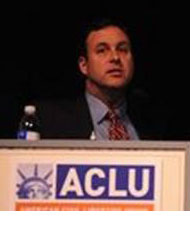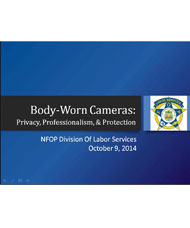The evidence suggesting that body-worn cameras (BWC) can reduce liability for a law enforcement agency and city is limited. It is reasonable to assume, however, that if BWCs reduce complaints against officers and officer use-of-force (as suggested by several studies), then the technology may also reduce liability risk. Several law enforcement agencies have used BWCs in a more targeted manner, by requiring officers with a history of complaints to wear the technology. Chief Chitwood of the Daytona Beach (FL) Police Department required an officer with a history of questionable complaints to wear a BWC (PERF, 2014). After several incidents in which the officer claimed that his camera had malfunctioned, the department was able to determine that the camera was turned off intentionally and the officer was subsequently fired. Chief Lansdowne, formerly of the San Diego (CA) Police Department, stated that BWC footage provides important information to investigate claims of racial profiling. "When it comes to collecting data, the raw numbers don’t always fully capture the true scope of a problem. But by capturing an audio and video account of an encounter, cameras provide an objective record of whether racial profiling took place, what patterns of officer behavior are present, and how often the problem occurs." (PERF, 2014: 8)
A number of agencies have found that the adoption of BWCs can be helpful in response to external investigations, consent decrees, and other forms of external scrutiny (PERF, 2014). Departments in Detroit (MI), New Orleans (LA), Spokane (WA), and Las Vegas (NV) have implemented BWC programs as part of agreements with the Office of Community Oriented Policing Services or the Civil Rights Division of the U.S. Department of Justice.
During the February 26-27, 2015 Bureau of Justice Assistance BWC Expert Panel, Damon Mosler, Deputy District Attorney of San Diego County (CA), explained, "there is a cost or consequence of stopping tape or not recording–it may have adverse impact that could call into question officers' motives, creating civil liability for (the) department." Expounding on the liability "costs," Donald Papy, Chief Deputy City Attorney for the City of Miami Beach (FL), shared, "we defend civil claims of police misconduct and there is extraordinary value in the civil realm as well as criminal." In contemplating how much money can be saved by having BWCs, Papy offered that "many cases would not proceed if a BWC video showed what actually happened–this should be studied." Further, Papy said that "potential liability and attorney fees are a huge issue for a municipality" and then provided an example of a case that could have been dropped if BWCs had been available: "a man driving a car was being pursued and he ended up smashing into a utility pole and when the police arrived he was lying outside the passenger side of the car. He was paralyzed. He claimed he had gotten out of the car to see the damage on the passenger side and then the police beat him into paralysis. Our evidence showed the car had violently spun around causing him to be ejected, winding up on the ground outside of the passenger side and was paralyzed. If the officer had a BWC, the video would have showed the truth."






